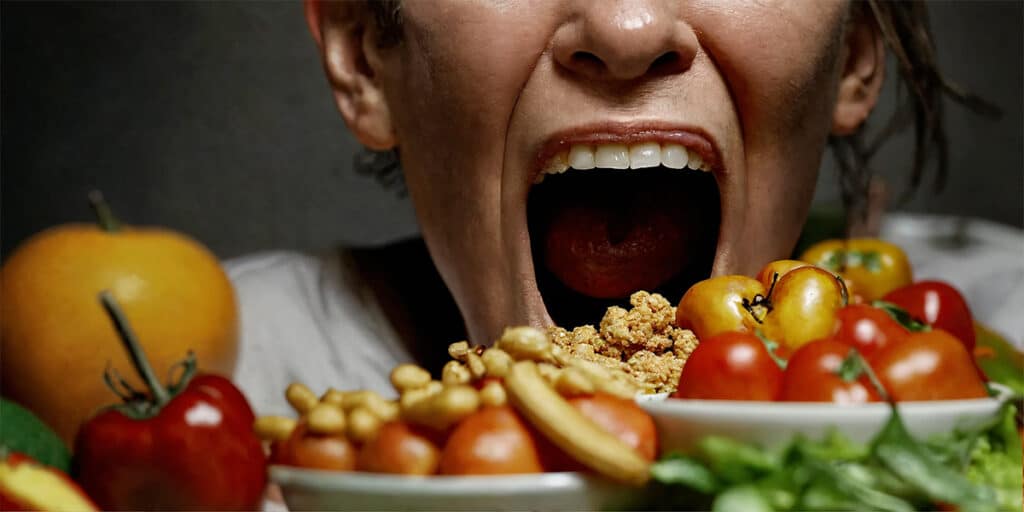Dry mouth, medically known as xerostomia, affects a significant portion of the population, particularly seniors. This condition can lead to difficulties in speaking, eating, swallowing, and can increase the risk of dental decay and gum disease. While there are several causes of dry mouth, including medication side effects and certain health conditions, natural remedies, particularly through diet, offer a promising solution.
This guide focuses on ten foods known for their saliva-stimulating properties, offering a tasty way to alleviate dry mouth symptoms and enhance oral health.
Top 10 Foods to Boost Your Saliva Production
Citrus Fruits: Nature’s Juicy Secret to Salivation
Embrace the refreshing power of citrus fruits to naturally enhance your saliva production. Oranges, lemons, and grapefruits aren’t just a burst of vibrant flavor; they’re your first line of defense against dry mouth. Rich in vitamin C, these juicy delights support gum health and wield antioxidants to boost overall vitality. The slight acidity found in these fruits acts as a trigger, waking up your salivary glands and providing a natural solution to dry mouth discomfort.
Harnessing the Power of Citrus
Vitamin C for Gum Vigor: The Journal of Periodontology underscores the critical role of vitamin C in oral health, linking a higher intake to reduced periodontal disease. This connection is especially crucial for those battling dry mouth, which heightens the risk of gum-related issues.
Antioxidant Richness for Well-being: Citrus fruits’ antioxidants, like flavonoids, are celebrated for their health-boosting properties, from quelling inflammation to strengthening the immune system, as noted in the American Journal of Clinical Nutrition.
Simple Ways to Enjoy: Kickstart your hydration journey with a glass of lemon-infused water each morning or by snacking on succulent orange slices. These practices are not just enjoyable but are a refreshing strategy to stimulate saliva flow.
Expert Insights and Real-Life Success
Dr. Jane Appleton, an expert in nutrition and oral health, highlights the dual benefits of citrus for those with dry mouth: the acidity and act of chewing not only prompt saliva production but also ensure hydration.
Mark’s story, a 58-year-old grappling with medication-induced dry mouth, brings this advice to life. By incorporating more citrus fruits into his daily regimen, particularly starting with lemon water, Mark noticed a marked improvement in his symptoms—a testament to the simple yet profound impact of dietary changes.
The Crunch That Counts: Vegetables for Saliva Stimulation
Dive into the world of crunchy vegetables such as celery, carrots, and cucumbers, celebrated not only for their nutritional value but also for their natural ability to kickstart saliva production. The simple act of chewing these fibrous, water-dense veggies sends a signal to your salivary glands, making them an ideal, natural remedy for dry mouth.
The Crunch Effect
Chewing as Nature’s Oral Cleanser: The mechanical action of chewing doesn’t just stimulate saliva production—it acts as nature’s own way of cleaning your mouth and neutralizing harmful acids, crucial for those with decreased saliva flow.
Effortless Dietary Additions: Integrating these vegetables into your daily meals is seamless. They can brighten up salads, serve as crunchy snacks, or enhance your main dishes, adding both hydration and nutritional value.
Supported by Research and Experts
Studies in the Journal of Dental Research affirm that the increased chewing activity, prompted by consuming crunchy vegetables, significantly bolsters salivary flow, underlining its importance for oral health.
Dietitian Emily Morrison champions crunchy vegetables not just for their hydrating properties but also for their role in naturally stimulating saliva—a dietary tweak that anyone looking to manage dry mouth symptoms can easily adopt.
More Foods for Thought
Beyond citrus fruits and crunchy vegetables, there’s a whole menu of saliva-stimulating options to explore:
Apples: Dubbed “nature’s toothbrush,” apples are fantastic for increasing saliva flow, thanks to their fibrous texture that encourages chewing and their nutrient-rich profile.
Ginger: A spice known for its medicinal qualities, ginger can activate the salivary glands, offering relief from dry mouth with its distinctive, pungent flavor.
Leafy Greens: Spinach and kale, with their high water content and rich nutrient profile, require more chewing, which naturally aids in saliva production.
Completing the top 10, we find:
- Berries: Bursting with flavor and hydration.
- Pineapple: Another tropical fruit known for its saliva-inducing properties.
- Almonds: While less about hydration, their crunchiness stimulates chewing.
- Yogurt: Its cool, creamy texture can soothe the mouth and encourage saliva production.
- Peppers: Mildly spicy foods can also kickstart your salivary glands.
Integrating a diverse array of these foods into your diet not only adds excitement and variety to your meals but also plays a crucial role in enhancing saliva production, naturally addressing the discomfort of dry mouth, and contributing to a healthier oral environment.
Spicy Foods: The Surprising Saliva Stimulants
While it may seem counterintuitive, moderately spicy foods can be a powerful secret weapon in your arsenal against dry mouth. Foods seasoned with spices like cayenne pepper, ginger, or even mild chili can trigger salivation. The heat from these spices stimulates the salivary glands, leading to increased saliva production. However, it’s essential to approach this remedy with caution, as too much spice can irritate the mouth or exacerbate certain conditions.
Benefits of Spicy Foods for Saliva Production
Natural Saliva Stimulation: The capsaicin in spicy foods is what triggers the salivary glands to produce more saliva. This natural response to the spicy sensation can provide temporary relief from the discomfort of dry mouth.
Enhancing Flavors and Dietary Enjoyment: Incorporating moderate amounts of spice into your meals can also enhance the flavor, making eating more enjoyable, especially for those who may find their sense of taste diminished by dry mouth.
How to Incorporate Spicy Foods Safely
Start with Mild Spices: If you’re not used to spicy foods, begin with milder spices and gradually increase the heat as your tolerance improves. This approach allows you to stimulate saliva without overwhelming your taste buds or causing discomfort.
Balance with Hydrating Foods: Pair spicy dishes with hydrating sides like cucumber salad or water-rich fruits to balance the heat and provide additional moisture for your mouth.
Expert Opinion and Cautions
Nutrition experts recommend moderation when incorporating spicy foods into your diet, especially for individuals with sensitive stomachs or certain health conditions. Dr. Sarah Thomson, a dietitian specializing in oral health, advises, “While spicy foods can be effective in stimulating saliva, it’s crucial to use them judiciously and listen to your body’s response. Not everyone may tolerate spices well, so it’s important to find the right balance for your individual needs.”
Personal Anecdote for Real-world Insight
Kevin, a 62-year-old with a history of dry mouth, shares his experience: “After adding just a touch of spice to my meals, I noticed an improvement in my dry mouth symptoms. It was a game-changer for me, making meals more enjoyable again. But I learned the hard way that too much spice wasn’t beneficial, so now I stick to a moderate level that’s just right for me.”
Incorporating spicy foods into your diet can be a surprisingly effective way to combat dry mouth, provided it’s done with consideration for your personal tolerance and overall health. As with any dietary change, it’s beneficial to consult with a healthcare provider to ensure it’s appropriate for your specific situation. By thoughtfully adding a bit of spice to your meals, you can enjoy the dual benefits of enhanced flavors and increased saliva production, making each meal a step towards alleviating dry mouth symptoms.
| Food | Key Benefit | Water Content |
|---|---|---|
| Cucumbers | Hydration | 95% |
| Watermelon | Hydration + Vitamins | 92% |
| Apples | Natural Teeth Cleanser | 86% |
| Ginger | Saliva Stimulation | N/A |
| Oranges | Vitamin C + Hydration | 88% |
| Celery | Fiber + Hydration | 95% |
| Carrots | Fiber + Vitamin A | 88% |
| Spinach | Iron + Hydration | 91% |
| Bell Peppers | Vitamin C + Hydration | 92% |
| Chili Peppers | Saliva Stimulation | 88% |
Staying Hydrated with Water-Rich Foods
Hydration is key to combating dry mouth, and integrating water-rich foods into your diet offers a two-fold benefit: direct hydration and the stimulation of natural saliva production. Foods like cucumbers, watermelon, strawberries, and peaches are not only delicious but are also packed with water, making them ideal for maintaining optimal hydration levels. These foods can be especially beneficial for seniors or individuals taking medications that may cause dry mouth as a side effect.
The Science of Hydration and Saliva Production
Research has shown that staying well-hydrated is crucial for maintaining saliva flow. A study in the Journal of the American Dietetic Association highlights the importance of adequate fluid intake for saliva production. By incorporating water-rich foods into your diet, you can naturally enhance your hydration status, thereby supporting the functions of the salivary glands.
Easy Integration into Daily Meals
- Start your day with a breakfast that includes fruit like berries or melon.
- Snack on slices of cucumber or bell peppers during the day.
- Include a side salad with leafy greens at lunch and dinner to boost your intake of water-rich vegetables.
The Crunch Factor
Crunchy fruits and vegetables serve as nature’s toothbrush, cleaning your teeth and gums while the act of chewing stimulates saliva flow. Foods such as apples, carrots, and celery not only require more chewing but also leave your mouth feeling fresher. This natural cleaning action can help reduce the buildup of bacteria and food particles, decreasing the risk of dental problems associated with dry mouth.
Chewing: The Natural Stimulant
Chewing is an effective mechanical stimulant for saliva production. According to research published in the Journal of Dental Research, the act of chewing significantly increases the rate of saliva flow. This is beneficial for oral health, as saliva helps to neutralize acids and distribute essential minerals throughout the mouth.
Tips for Incorporating Crunchy Foods
- Keep raw vegetable sticks or slices of crunchy fruits readily available for snacks.
- Add a crisp apple or pear to your lunch for a refreshing end to your meal.
- Include a raw vegetable salad with dinner, dressed lightly with lemon juice or vinegar to enhance the stimulating effect on salivation.
Spicing Up Saliva Production
Spices and herbs are not just culinary tools for enhancing flavor; they can also play a significant role in stimulating salivary gland activity. Ginger, in particular, is renowned for its salivation-inducing properties. Its pungent flavor can prompt the salivary glands to produce more saliva, which is beneficial for moistening the mouth and aiding digestion.
The Role of Spices in Salivary Stimulation
The Journal of Ethnopharmacology includes studies on the effects of various spices and herbs on saliva production, noting that substances like ginger contain compounds that can trigger the reflex pathways responsible for salivation. This natural stimulation is especially helpful for individuals looking for ways to alleviate dry mouth symptoms without relying on artificial products.
Incorporating Spices into Your Diet
- Brew a warm cup of ginger tea in the morning or after meals to aid digestion and stimulate saliva.
- Add freshly grated ginger or a dash of cayenne pepper to your dishes for an extra kick that also boosts salivation.
- Experiment with herbs and spices in your cooking to find enjoyable combinations that also promote saliva production.
By adopting these natural solutions for boosting saliva production, you can enjoy the dual benefits of enhancing your diet with nutritious foods and alleviating the discomfort of dry mouth. Each of these methods offers a simple yet effective way to stimulate saliva flow, improve oral hygiene, and support overall health.
10 Must-Eat Foods to Boost Your Saliva Production Naturally: Your FAQs Answered
Why is saliva production important?
Saliva helps in digesting food, protecting teeth from decay, preventing infection by controlling bacteria, and keeping the mouth moist and comfortable.
Can eating cucumbers really help with dry mouth?
Yes, cucumbers are 95% water, making them excellent for hydration and stimulating saliva production.
How does ginger help in stimulating saliva?
Ginger has natural compounds that stimulate the salivary glands, increasing the production of saliva.
Are there benefits to eating spicy foods for saliva production?
Yes, mildly spicy foods can activate salivary glands. However, they should be consumed in moderation to avoid irritation.
How can apples help with saliva production?
The act of chewing an apple increases saliva production, plus its high water content adds to hydration.
Can drinking lemon water increase saliva production?
Yes, the acidity of lemon stimulates saliva flow. It’s best to drink lemon water in moderation to protect tooth enamel.
Are there any foods to avoid for someone with dry mouth?
Dry, salty, or spicy foods can exacerbate dry mouth. It’s best to avoid alcohol and caffeine, as they can dehydrate.
How often should I eat these saliva-stimulating foods?
Incorporating them into your daily diet in various meals and snacks can help maintain consistent saliva production.
Do leafy greens like spinach really help with dry mouth?
Yes, leafy greens are high in water content and require more chewing, which helps stimulate saliva.
Can a diet alone manage dry mouth effectively?
While diet plays a significant role, staying well-hydrated and maintaining good oral hygiene are also crucial in managing dry mouth.
Citations
- Dodds, M. W., Johnson, D. A., & Yeh, C. K. (2005). “Health Benefits of Saliva: A Review.” Journal of Dentistry, 33(3), 223-233. This comprehensive review discusses the multifunctional role of saliva in oral and general health, highlighting its importance in digestion, dental health, and antimicrobial defense.
- Pedersen, A. M. L., Bardow, A., Jensen, S. B., & Nauntofte, B. (2002). “Saliva and Gastrointestinal Functions of Taste, Mastication, Swallowing and Digestion.” Oral Diseases, 8(3), 117-129. This paper details the critical roles of saliva in the digestive process, including its enzymatic actions and its importance in taste and mastication.
- Narayana, S., & Woods, C. (2014). “Effect of Citrus Flavonoids, Naringin and Naringenin, on Metabolic Syndrome and Their Mechanisms of Action.” Advances in Nutrition, 5(4), 404-417. This article investigates the health benefits of citrus flavonoids, focusing on their potential to improve symptoms of metabolic syndrome, which is relevant due to the antioxidant properties of these compounds that may also influence salivary gland function.
- Riera, C. E., Huising, M. O., Follett, P., Leblanc, M., Halloran, J., Van Andel, R., … & Dillin, A. (2014). “TRPV1 Pain Receptors Regulate Longevity and Metabolism by Neuropeptide Signaling.” Cell, 157(5), 1023-1036. This groundbreaking study reveals the role of capsaicin (found in chili peppers) in activating TRPV1 receptors, which can stimulate saliva production. It provides a molecular basis for the saliva-inducing effects of spicy foods.





